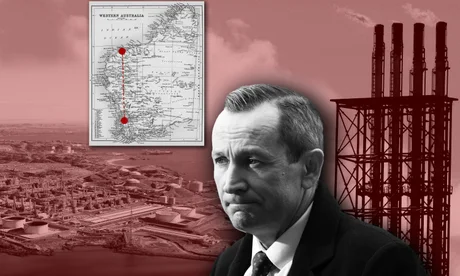The Western Australian Labor government is currently being accused of shelving plans to introduce climate change laws before a state election next March after it left the bill off a list of legislation it hopes to pass.
According to reports, the absence of the climate bill – from the list of 14 legislative priorities circulated with the Liberal party and crossbench MPs – reignited claims that WA Labor is in thrall to the gas industry and failing to address the climate crisis.
WA is known to be the only Australian state without a 2030 emissions reduction target. National data says climate pollution in the five eastern states fell by at least 27% between 2005 and 2022 while rising 8% in WA, largely due to the state’s expanding liquified natural gas (LNG) export industry.
Guardian Australia revealed that modelling presented to the state government late last year suggested its emissions would be about 20% above 2005 levels this year.
The climate legislation – which would formalise a state net zero target for 2050 and eventually require the government to set a statewide emissions target for 2035, but not for 2030 – was introduced to WA parliament last year.
Read also: Study shows Wildfires are burning through humanity’s carbon budget
At the time, the state’s climate action minister, Reece Whitby, said the government recognised legislated targets were “the best way to mobilise the capital required for the net zero transition”.
Climate scientists and campaigners have criticised the bill’s targets and timeframes as falling short of what is required to address the problem. The government has also faced some internal resistance over its stance on environmental issues.
Greens MP Brad Pettitt said that with only five parliamentary sitting weeks before the election, the priority list showed the government was “not even going to bring on the very thing that at least could have got WA started”.
“The Cook government’s gas fanaticism is proving to be a self-fulfilling prophecy that is driving future reliance on gas and, unsurprisingly, failing to facilitate the rapid transition to renewable energy the climate science calls for,” Pettitt said.
Story was adapted from the Guardian.
